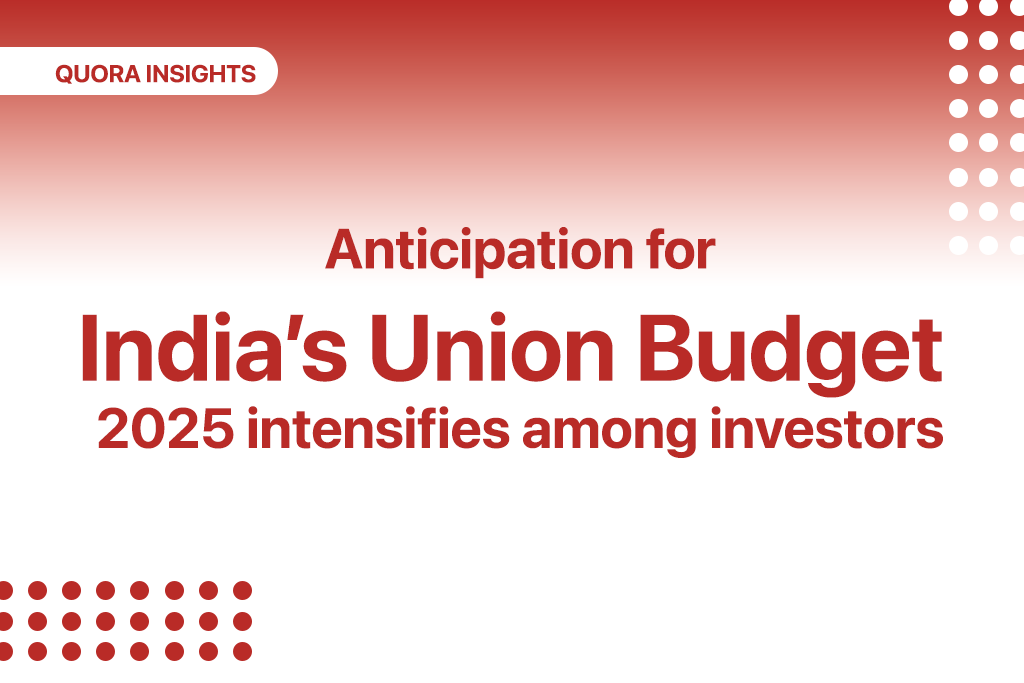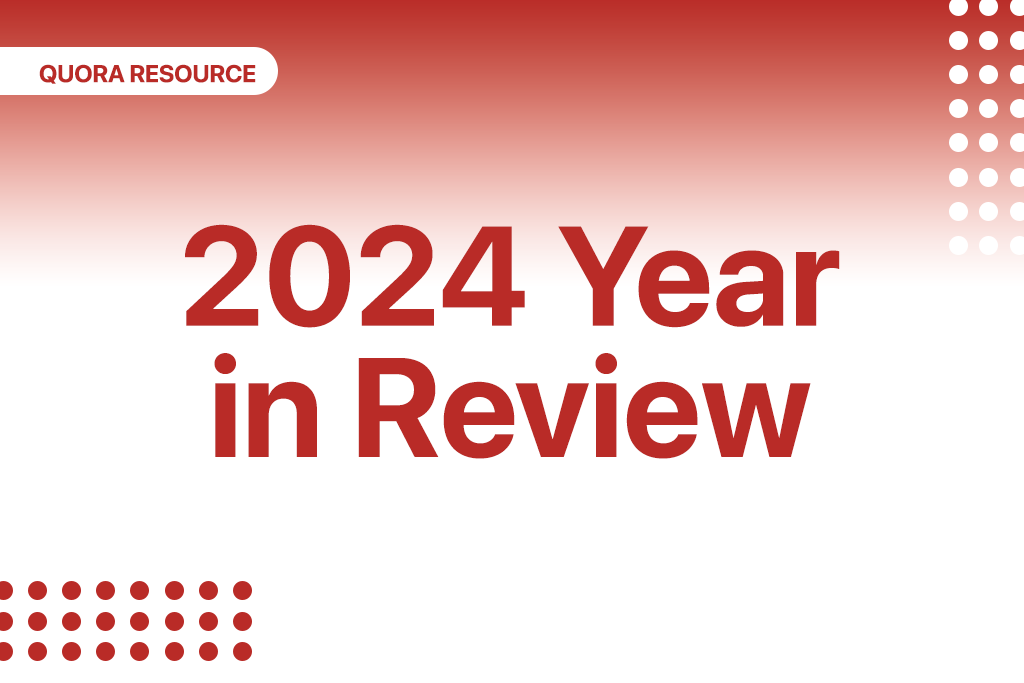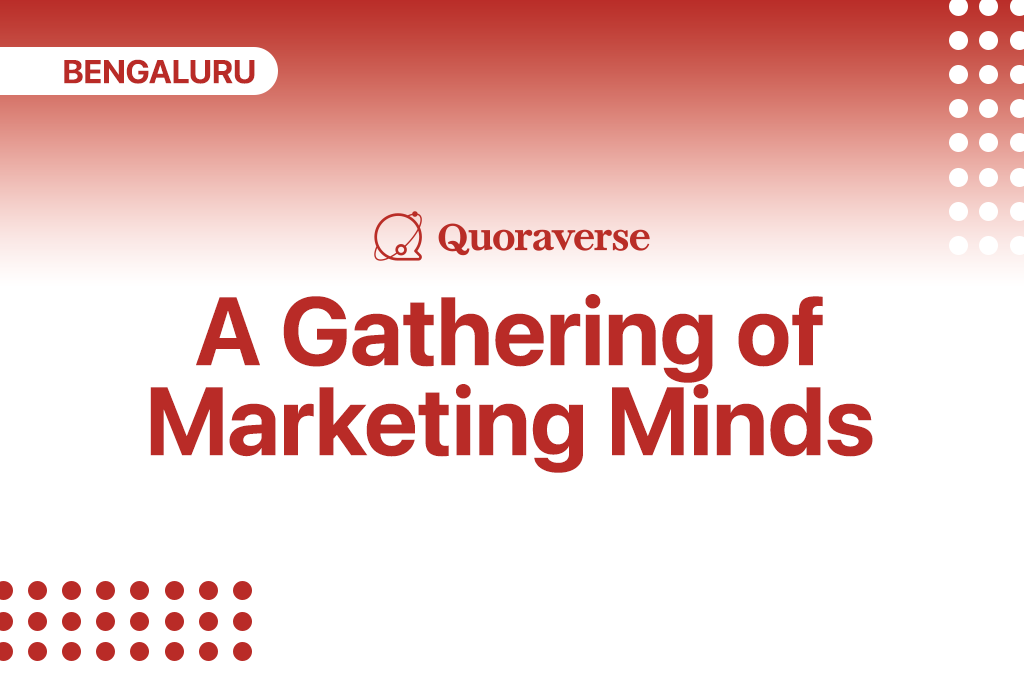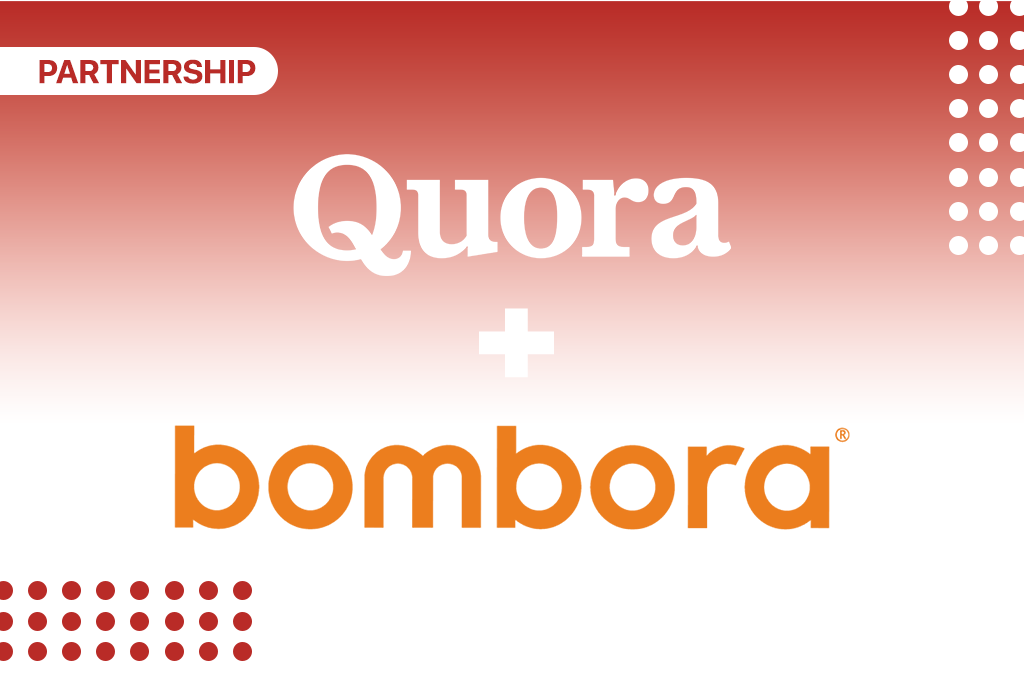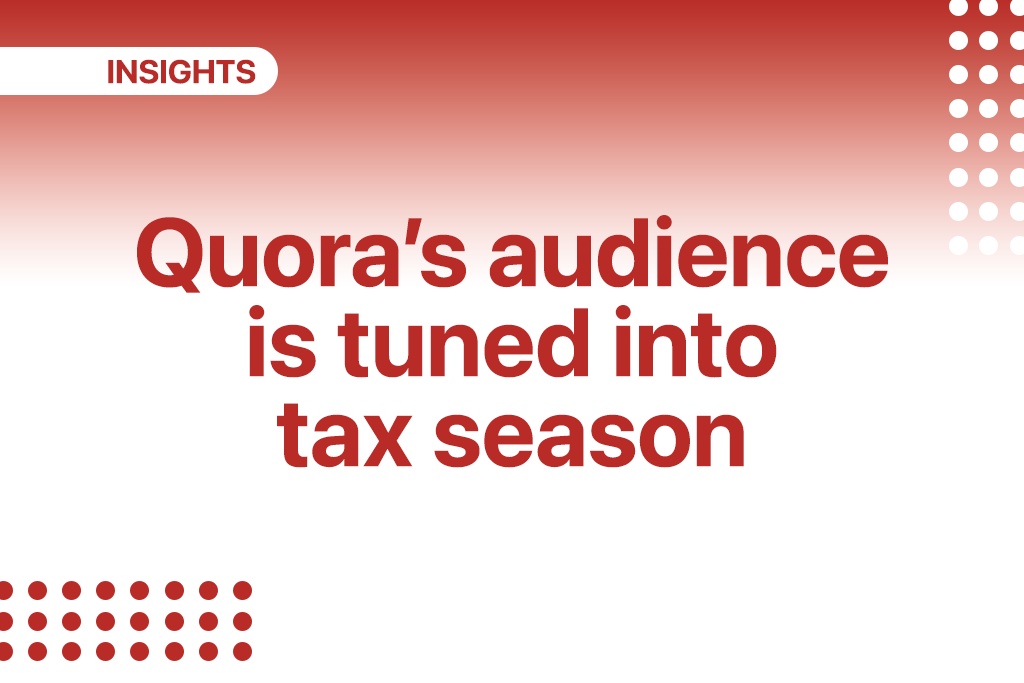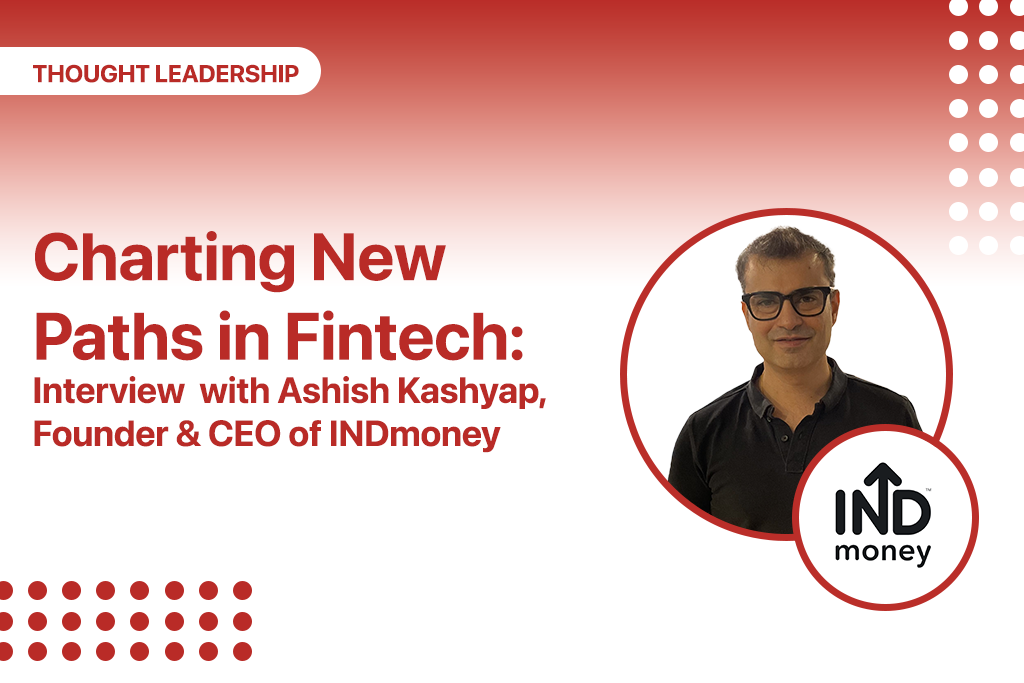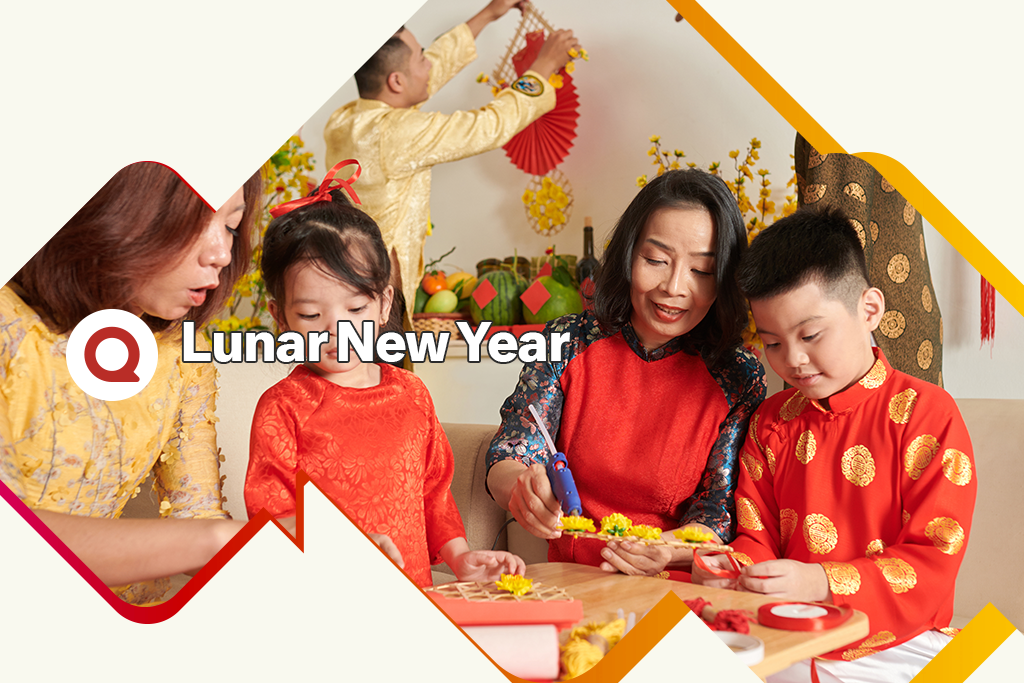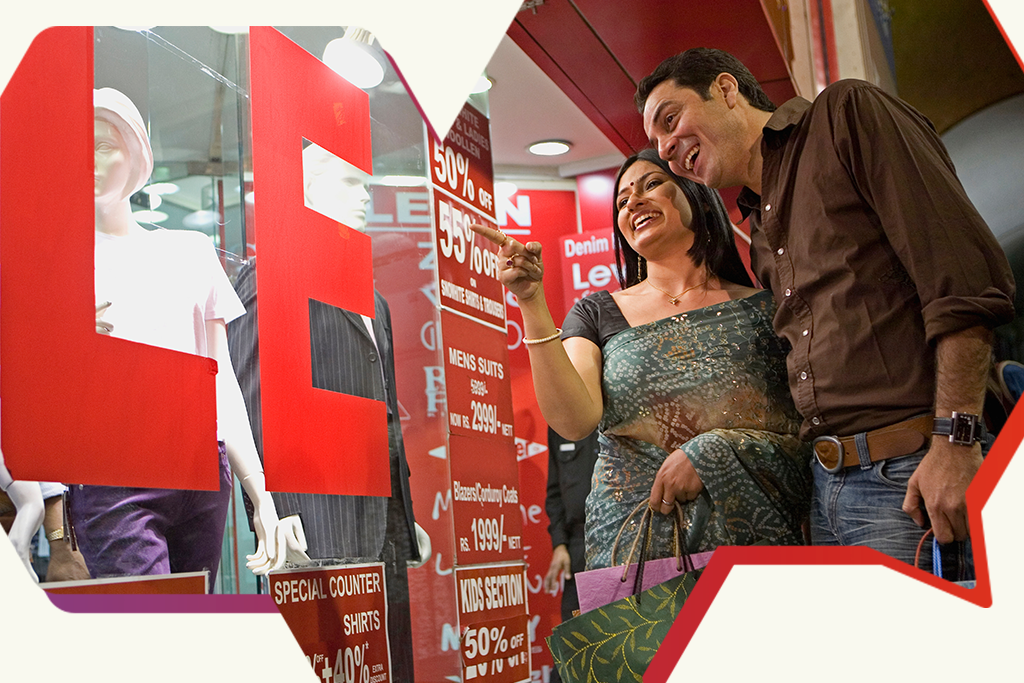Hi, I am Anati Zubia. I’m head of marketing at Quora. And it is my pleasure to introduce to you Andrew Tasker. Andrew runs our agency partnership program at Quora. Andrew has over a decade of experience helping agencies and brands drive those meaningful connections that you make with consumers through digital media. He can also pedal circles around any of us on his Peloton. My other guest here today speaking is Toby Lee. He heads up Quora’s very own demand gen efforts, and I am convinced that he is fueled purely by boba tea. He’s an experienced agency marketer and account manager turned in-house marketer, and he’s directly responsible for the research data and the insights that you’re going to be hearing from us today. So without further ado, let’s deck the halls.
Anati Zubia:
What is Quora? Quora was founded in 2009 by Adam D’Angelo, and he had the mission to share and grow the world’s knowledge. In just the first two years, Quora actually grew to 150,000 users, and they came here to share, learn and grow right towards the mission. So it was an instant connect to fill in the market space with a gap that was there. From questions that are things like, “What CRM should I choose for my startup,” to, “Why does my cat purr,” Quora is really a place where users are actively seeking solutions and connecting with those experts that can answer them. In 2018, Quora launched Quora ads, and since then been adding new formats, targeting and even integrations to continue to serve brands on our platform.
Anati Zubia:
Some of the people on Quora, it’s very diverse. As you can see, that global footprint is there, from celebrities to entertainers. We even have astronauts, science fiction writers that are here, experts from all walks of life that come here just to share their knowledge, and those who are looking to learn from those who are sharing it. There’s no financial transfer to come and learn something on Quora, and that’s what’s so beautiful about it. In fact, a lot of our initial users discover the platform by asking a question in a search engine, and then they end up on Quora beginning their learning journey. So it’s just a little bit of a different experience.
Anati Zubia:
And that experience really ties into our reputation for being a living, breathing community of knowledge and discovery. That’s what sets Quora apart from other information based websites or social media platforms that you might be familiar with. We are really the perfect intersection of those two things, and I’ll explain how. So people come to core actively seeking information. They’re not just passively scrolling or they’re not here for a social engagement. They’re here with a true purpose. There’s an intent there. Those experts then are answering those questions and sharing their knowledge, building out interest focused communities, and really building their reputation as a thought leader inside that area of expertise.
Anati Zubia:
And then everything we do here is community driven. So those users who came here for answers are using up-votes and engagement to really highlight what answers are the most valuable to them, and that’s how our system really works here. So when you go into a question to find an answer, the best of the best is at the top. And that’s what keeps our users coming back time after time. They’re seeking that information, we have the experts, it gets ranked up. It’s all built around this heartbeat of machine learning. And so it’s fresh and exciting every time you come into Quora looking for those answers. And the bus stuff is up at the top there, it’s always evergreen, it’s easy to find. So whether it was a topic five years ago that’s trending or trending today, you can find answers to those questions on Quora. So a little bit more about how that experience fits into a brand or a business on Quora. I’m going to let Andrew jump on and elaborate a little bit more for you. Take it away, Andrew.
Andrew Tasker:
Awesome. Thanks Anati. Thanks everyone for hopping on. If you’re new to Quora, I think this particular slide, this flywheel that Anati just walked through of knowledge seeking, knowledge sharing, that community validation piece and then the personalization for the user, that’s what really makes Quora super unique compared to a lot of other platforms. Being able to access this trusted information and advice from this ecosystem of hundreds of millions of people across all walks of life, experiences, this is what Quora’s mission is, to democratize knowledge. It’s really this model that’s really organized around Q&A that offers a unique opportunity for brands to join in on that experience and influence that buyer journey.
Andrew Tasker:
What makes Quora so different from other platforms, Anati you can go to the next slide, is it’s not a passive platform of quick thumb scrolling, like Anati mentioned. It’s also not a place where people have necessarily already made up their minds. The user mindset on Quora is more about, I’m actively learning, I’m researching, I’m investigating. I need more information. I’m not ready to make a decision yet, but I’m getting close. And I need real feedback from people that have been there, done that and have personal experience to back it up. Question pages, recommendations, home feeds on Quora, they’re not oriented around what is known as a follow graph. It’s not your friends and family that you’re following per se. It’s rather Quora is designed to surface what are the best questions and answers to those questions based on your own interests and the questions you’re consuming across the platform. And as we all know, the buyer journey, it’s not a funnel. We wish it still were that straightforward, but rather it’s a bunch of non-linear touchpoints, all of which are building momentum towards that final decision. When we look at the majority of our audience on Quora, we see 64% are conducting research before they make a purchase. So being able, again, to reach audiences in this deep research mode, it can be a prime time moment to influence their next move.
Andrew Tasker:
The reasons people come to Quora can be for a lot of different reasons. It could be to evaluate and compare specific products and services. It can be to gain new knowledge, so they’re wanting to learn something new. It can be to find support and getting feedback from peer groups and/or product experts that are answering those questions on the platform. And lastly, it can be to be productive. If you need just a quick answer, you need advice to a pressing, question with all of our advanced targeting capabilities, brands can key in on these target moments and what is the pull that is bringing people to Quora. So they’re not just researching, but they’re buying products along the way. Toby will expand on this a little later when he gets into the deeper insights on the platform, but ultimately the audience’s disposition to conducting research and their preference to buy things online is coupled with a very positive response to the branded advertising that they’re engaging while spending time on Quora.
Andrew Tasker:
Another important aspect and integral part of Quora’s platform is the assignment of topics to the questions being asked. In addition to what you see here, Quora covers an expansive list of over 300,000 plus topics and growing, just based on the questions being asked. This is a super important detail because each question on Quora is assigned topics that are in effect contextual labels. So it can range from things from broader topics like you see here, it could be beauty, consumer electronics, to more specific topics like online deals, savings, cyber Monday, and shopping hacks. These topics and keywords and specific questions are all opportunities for brands to target high intent and contextually relevant environments. As we head into the holiday season, we wanted to highlight a few of these verticals that brands can tap into across relevant topics and interests. Looking within eCommerce and retail, last holiday season, we actually saw a record level of engagement in over 14 million plus views of eCom retail related Q&A. So as you can see, across followers, up-votes and engagement, millions of people are actively following, engaging, asking and answering questions within the context of eCommerce and retail.
Andrew Tasker:
Furthermore, 80% of people on Quora, they discover brands via paid media. So they’re very receptive to paid ads in contextual environments. 66% are researching products and brands online so they’re not necessarily big on in store direct mailers or other offline activities. And then 94% are more likely to mainly use forums and message boards when researching brands, products and services. So we know consumers are getting more and more savvy in how they shop and research products and make those decisions, which includes relying on more firsthand experiences and advice from other shoppers.
Andrew Tasker:
The next vertical we wanted to highlight is consumer electronics. Quora’s audience is a pretty tech savvy bunch. Year over year, we saw 45% growth in views around this topic during the holiday season. People on Quora are 141% more likely to be early adopters of tech. 54% are more likely to buy the latest and greatest gadgets as soon as they’re available. So again, you can see just the sheer volume of active followers, audience engagement, the up-votes, the comments, questions, and answers that are being viewed around consumer tech topics, things like smartphones, iPhones, laptops, headphones, and a lot more.
Andrew Tasker:
And then lastly, we wanted to look a little bit beyond the holidays for brands that may fall within that health vertical. So come January, that new year, new me mindset starts to surge on Quora. Health related topics in January this year spiked 50% year over year. There’s a massive active following of 50 million people that are consuming health related topics and viewing over 30 million answers that are live on the platform. Right after the holiday season, health brands can take advantage of a much less competitive ad marketplace as those big brand dollars, those big awareness budgets during the holidays get out of the way, and they can capitalize on a health minded community looking for advice to achieve those personal health goals. Again, this is just three of over 300,000 topics that are available to tap into, but hopefully it gives you an idea of the scalability, the variety, and the contextual alignments we can put in play for your clients across a lot of different verticals.
Andrew Tasker:
It’s these types of unique insights around trends and topics that our client success team leverages to help develop an effective ad strategy for each unique partner that we support. Across the entire customer journey, no matter where your KPIs lie, whether that’s brand building, driving sales, building brand trust and consideration, with the combination of our targeting capabilities, the native ad formats available and the advanced conversion tracking that we can put into play, we can put together a tailored strategy and deliver against a wide variety of targeted KPIs. So to quickly see just a few examples of brands running on Quora, you can see the wide array of product types, services, verticals, and objectives. Whether it’s personal wellness, home appliances, deal shopping, entertainment and beauty, questions that people have and why they end up on Quora for trusted information can come in all shapes and sizes. We’ll take a closer look at a few brands later on that we work with and the success they’re finding on Quora, but first I’ll hand it to Toby and he’s going to share some key insights around Quora’s high value audience and some of their holiday shopping behaviors.
Toby Lee:
Great. Thank you for sharing all that, Andrew. As we mentioned earlier, Quora has an enormously high value audience that I know all the agencies such as yourself would love to tap for your clients and to be able to reach, to give them a few gifts here and there. So what we see here, we have some basic demographic information for our US audience. First off, on the gender breakdown we have around roughly half split between male and female, 55% male and 45% female. And when we look into the age skew and just the age ranges of Quora users, we have around 23% that are under 24. And we see a lot of significant concentrated purchasing power as we move a little bit higher on the demographic scale. We see purchasers of all age ranges and of all generations from gen Z, to millennials, to gen X, to boomers as well. We notice a particularly high concentration for people under the age of 44. So this would be perfect for gift givers, as we see later, who are giving gifts to their coworkers, to their friends and family and whatnot.
Toby Lee:
As we noted a little earlier, Quora’s audience is enormously high value. You can’t find them just anywhere else. As we see here, the scale and just the quality of our audience is unmatched among other platforms. Particularly things that we like to note is the education level of most Quora users, as well as the annual household income that we see here. Basically, half of Quora users have an undergraduate degree or higher. And with that breakdown being 30% with a college degree and 20% with a grad degree, we’ll notice later, and Andrew did hint at this earlier on, but Quora users do a lot of research as they investigate what are the best solutions and what are the best products for them to give that their families, their friends, as well as their coworkers, or just any sort of solutions that they are brainstorming.
Toby Lee:
We see here that there’s a lot of purchasing power as well, with over 40% of Quora users having a household income higher than $85,000 per year. This allows for, as we move into the holiday season, a lot of good gift giving gift lists and wishlists to be filled as Quora users start shopping for the holidays. Next slide now. All right. And Andrew hinted earlier that the difference between Quora users compared to other platforms users is that instead of just passively scrolling and looking without much intent, Quora users actively seek solutions to problems that they are thinking on the daily, on the weekly, and as we approach various seasons, whether it’s the holiday season, home appliance season, whether they’re buying a new home and whatnot.
Toby Lee:
We see that among some common platforms, Quora users are most likely to find products to purchase and to use social media and to use the internet to do this. 26.6% of users on the internet are finding products to purchase via Quora. And then they are also much more likely to make digital purchases when compared to some other platforms here. There’s almost an over 5% of a difference between us and the next leading average platform to make digital purchases. And these digital purchases include the wide gamut of things from eBooks to eLearning courses, and also including premium purchases as well. These would include premium subscriptions, such as Hulu Plus or our very own Quora Plus service, Reddit Gold, et cetera. We see here that Quora users are primed to purchase and they’re willing to invest money to have better solutions for their problems.
Toby Lee:
In case I haven’t made it clear, we do a lot of research on our users through our survey partner, Global Web Index. And they’ve indicated a noted to us that the users on our platform definitely perform lots of online research before they make their purchase, making our platform a great place for your brand to be in order to be seen, to be heard and to be recognized. Over 64% of Quora users perform this online research before they make their purchases. And these purchases include very high involvement items such as, oh, what should I buy for my electronics? What should I buy for TV? And we see these trending questions appearing around the holidays, such as those on the right. When’s the best time that I should start shopping for the holidays? Should I shop in store for the best deals or should I stop online? How much should I actually budget for Christmas gifts, especially in this economy? What are the hot gifts for kids this year? And what are some stocking stuffers that I can buy for those friends and family I’m not super close for, but still need to get a gift? And what are some of the best ideas that I should give this year?
Toby Lee:
We see here, further from our survey partner, that Quora users are 70% more likely to use review apps and websites such as ourselves to perform this research and to conduct this research so that they know what they should buy their loved ones this holiday season. What’s even more important is that compared to ads and other platforms’ users, our users are more likely to pay attention to ads and to businesses that want attention from users so that businesses can pitch their solution in front. When we come to the question of how do users discover brands and how do shoppers see what they should buy via paid media, that includes ads, TV, radio, et cetera, but especially social media ads, by and far Quora users are most likely to discover new brands that they would consider purchasing via paid media, via ads. And these users are all on Quora.
Toby Lee:
We see here as well that the likelihood of users to discover brands via ads seen on Quora is very high for desktop users on the left, and then on the right for mobile tablet users, also very high. This compares to other platforms’ audiences, which are less prone to discover brands from sites or from ads that they see. Quora users are a lot more predisposed for this. And so this makes our platform a great place to be because users actively want to seek new information. They want new brands and they want to hear from companies what they have to offer.
Toby Lee:
And when we come to these ads that Quora users see, they’re more responsive and more likely to act as a result. We see here from these two charts, again, from our survey partner, Global Web Index, that Quora users are highly likely to buy these brands that they see advertise online compared to the average internet user. I think the data here speaks for itself when it comes to Christmas shopping or when it comes to just shopping and purchasing in general, Quora users are a great audience to reach because they are actively seeking information and they’re actively posed to lean more into finding out what the best solutions are, making them a very receptive audience to hearing what brands have to say. Quora users are also more likely to click on promoted posts and to click on these ads to discover more information.
Toby Lee:
I know that I’ve hammered in the point really well here, but what is most amazing as we get into this high holiday season is that Quora users are likely to show purchase intent around this time of year, starting just around the corner in September. When we look at the count of questions and answers regarding holiday shopping, we see that our users start researching very early on in the season. When we look at these spikes, you see those every year a little bit appearing around Q4. That spike already starts in late August and early September, making now the best time to start brainstorming campaigns, to start building campaigns and to start talking with your clients, “Hey, how can I reach more users? How can I reach more purchasers? What are the new channels I should look into to expand?”
Toby Lee:
Because we talked about high purchase intent earlier, we look at these questions that Quora users are asking every single day. What’s the best online shopping site to buy holiday gifts? How do I find the best deals, especially in this economy right now? Users want to find what’s the best bang for their buck, what’s the best deal they can harvest to have the best gifts that they can show their loved ones?when it comes to last minute holiday shopping, this is more important as we get closer to Black Friday, to Cyber Monday, to Christmas, to Diwali, to Hanukkah. What’s the best place that can give me those gifts on time so I know that my gift will arrive on my loved one’s store step as early as possible? And what are some holiday shopping tips for those big families? How do I buy the best stockings, et cetera? I think most important is that when we get into those high demand holiday gifts, we have questions such as, where can I find the best holiday bundles for PlayStation 5? How can I find the best new other miscellaneous game console? How do I find the best new beauty product that’s taken social media by storm, et cetera?
Toby Lee:
And as we mentioned earlier, Quora users love deals. There’s a reason that they ask questions on our platform as to where the best deals are and then where the best couponing sites are, where they should find the best holiday gifts. Where can they find the best Black Friday deals, Cyber Monday deals? We know that electronics and consumer electronics sell a lot and sell very well in Q4. Where can I find the best 55 inch TV, 63 inch TV, 75 inch TV, so on? Where can I find a PlayStation 5 in stock? And should I find these deals online or should I find them in store for the best deal for my dollar? We see, as we mentioned earlier, Quora users are already starting to research and plan this strategy late October, early November, even though Black Friday is in late November. So it’s never too early to start talking to us, to talk to your clients about when the best holiday campaigns should start being planned.
Toby Lee:
And as we mentioned, Quora uses love giving gifts. You’ll see this occur to loved ones, including their friends and family around Christmas time, around Hanukkah time, but also around unofficial holiday seasons, like your workplace secret Santa, your workplace white elephant, your organizational white elephant. And so with all these gifts that Quora users have to find, they come to Quora asking questions such as, is the gift card better to buy for this than a physical gift? What are some Christmas gift ideas for my female or male heavy workplace? What are the ideal holiday gifts to give to my teacher who has taught my student and put up with him or her for the entire semester? Do people really appreciate socks as the holiday gift? Does Santa really come down the chimney? And what website is best for sending holiday gift boxes to my friends, to my family, to my clients, to my vendors and whatnot? Quora users, overall, as you see here, there’s that huge spike in Q4 every year with a lot of intent as they want to seek more information.
Toby Lee:
Just a few more slides of data here, but I think what’s most important is that this is not limited to Christmas alone. We do know Christmas is the predominant holiday in the United States, in the Western hemisphere, but other holidays come about as well. Hanukkah has a lot of questions where Quora users are asking, hey, what are some Hanukkah transitions? And then what are some of those best holiday practices I should enact? What are some gifts that I can buy for Diwali? What are the best ways that I can prepare Thanksgiving turkeys? What exactly is Kwanza and how do I best celebrate it and be a part of that community? What are some New Year’s celebrations and places that I should go to? And I think what is most important to note here is that Quora is highly multicultural. We’re not limited to Western audiences alone with Christmas celebrations, but as Anati will discuss soon, Diwali is a great big shopping season as well for our Indian user base. And when it comes to that time of year, they give a lot of gifts as well. So Anati, take it away with some of our case studies.
Anati Zubia:
Absolutely. It’d be my pleasure here. So just diving back into a great success story for you on a brand that I’d love to share, Headphone Zone, they’ve been in business since 2011 and they are India’s premier online store for consumer audio technology, anything from earbuds like I have on right now to your full fledged gaming headsets, they are the place to be. So Headphone Zone turned to Quora; they had a goal of becoming an industry thought leader and influencer. They really wanted to build a strong brand awareness around the products that they provide to their customers. And they wanted to help buyers make very informed decisions. There’s lots of questions that go into what is the best headset for the particular use. And so with the festive season coming up in India, and Q4 being the biggest quarter of their year, they were really looking at how do we tap into people who are researching so that we can help them make an informed decision and hopefully make a purchase from Headphones Zone?
Anati Zubia:
Specifically, they actually jumped in, they looked at our Topic Targeting. They wanted to find people asking those exact questions, like what is the best gaming headset for me? Or, what’s a great noise canceling headphone that I can use for remote work? So they wanted to tap into those specific questions or specific topics. People are doing that type of research. And so they use that type of targeting in conjunction with our Promoted Answers product. Slight segue here. What is a promoted answer? It’s the first time you’re probably hearing that, at least in this presentation, and we’ll talk about it a little bit more. But Promoted Answers is actually Quora’s exclusive native ad format. It gives advertisers the opportunity to provide answers and then push those answers to the top of the page. And so it feels just like a very natural experience. It’s what you’re seeing actually on this screen there, it is an example of a Promoted Answer. It looks exactly like an answer other than the fact that it’s promoted by Headphone Zone. So it’s a great user experience on that end, and it also gives brands an opportunity to really show that authority in their industry space by answering those questions with great information and citing and providing links.
Anati Zubia:
So that’s what Headphone Zone tapped into. Their Promoted Answers campaign generated 2.6 million content views. So they had a massive impression base off of that. They also had a really great click through rate at 3%, and then they did all this with cost per click at less than a dollar. It was very cost effective for them to reach a big, broad audience, get all that information out that they wanted. They really wanted to get that brand out there. But what really highlights this campaign is the fact that they had over 90 purchases driven from their content in just under two months, and so they really drove that forward. And the beautiful part about this campaign is all of those answers that they provided are evergreen, whether they’re promoted or not, they are on the Quora platform forever for users to tap into. So very exciting to see them have that type of success around the holidays. But Headphone Zone is just one example of successful brands. I’m going to turn it over back to Toby to tell us about another successful holiday campaign. Go ahead, Toby.
Toby Lee:
Great, thanks Anati. A few years ago that we onboarded this massive consumer brand, Manscaped. They do various trimmers and targeting the male audience of Quora. Given the holiday success and given that their goal is to increase sales during the holiday season to go beyond their traditional channels, especially with the COVID pandemic and needing to find new places to advertise and to tout their brand, they reached out to us at Quora to brainstorm a solution that would reach the relevant audience at the right time, right before the holiday season starts. How they went about this is that they launched this huge global campaign that reached over 30 countries across the whole world that they could fulfill, to bring to them a holiday sale offer, as well as just some educational offers that highly targeted and provided some whimsical creative that targeted our user base and reached them in relevant manners that our users would respond to.
Toby Lee:
We have a wealth and abundance of different targeting options, ranging from targeting topics that questions relate to as well as various interests that users demonstrate interest in, as well as, of course, your standard gamut of remarketing audiences, lookalike audiences and all. And Manscaped leveraged all of these to reach the right people that they know would purchase their products. What was cool here is that they used the idea of a good deal. We see here they have a 20% off deal that they were running during the holidays. And they used that to entice people who have visited their sites via remarketing to finalize and to make their purchase. They also used other whimsical, creative ads that would target topic areas such as dating, such as exercise and other various male related topics that our male audience was gravitating and forming a community around and to tout the solution as, “Hey, have you considered us? Would you consider buying us?” And using some puns to reach that audience and reach them in a manner that they would be receptive to. What this led to is that it led to much higher than average click through rates for the image ad format that they mostly leveraged. And that led to hundreds of new purchases during the holiday seasons across all of their geos. So I’ll turn it back to Anati for our final case study.
Andrew Tasker:
Actually, I’ll jump in on that one, Toby. So to round out these case studies, we wanted to highlight one more great partner of ours, GenoPalate. Genopalate is, if you don’t know, a genetics based personal nutrition company. So they’re leveraging Quora as a platform to educate and help drive sales of their DNA kits. Through our collaboration with them, they’ve found success leveraging one of our more unique and high impact ad formats, Promoted Answers, which Anati spoke about for Headphone Zone earlier. As she explained, Promoted Answers gives brands an opportunity to expand on product details, and it shows up across the platform in the form of a Q&A layout, so it’s much more native to that Quora experience and offers a lot of different dynamic features to place within that Promoted Answer.
Andrew Tasker:
Another unique benefit of Promoted Answers is that it can be answered by either the brand directly or from an individual contributor, which the latter is what GenoPalate found to be the most successful. You can see in this example from Luke Wilson, he’s the one that is actually answering this question that GenoPalate then is promoting across the platform, which includes embedded links and opportunities for audiences to head over to GenoPalate and purchase DNA kits. They continue to find evergreen, always on success all year long. So they’re driving an average of 20 plus conversions each day. But to further capitalize on the anticipated holiday season spike, Quora conducted a brand study to help GenoPalate validate their holiday marketing strategy and get ahead of the busy shopping season. This survey based study was it was designed to align with their objectives and help identify and define audience buyer segments that are most high intent to purchase their DNA kit. The study’s results help them identify and inform product fit across each of these audience segments, as well as pricing guidance to help allocate media investment towards that highest intent audience across Quora.
Andrew Tasker:
Additionally, the study helped improve the value of our audience compared to other advertising channels, which the good news is that resulted in an increased investment of 400% against their daily budget heading into the holiday season this year. Like GenoPalate partners that work closely with our client success team, they can help you navigate our best practices, some of the nuance of the platform, help analyze campaign performance, surface all these unique audience insights along the way. All of this is a part of our commitment to helping you quickly understand the value of Quora’s platform for your partners and the brands you work with. If you’re joining today from an agency and/or a brand, for that matter, and you’re interested in getting started on Quora, we’d love to get you going on our agency partner program. Anati, can you flip the slide please? One more, actually. Thank you.
Andrew Tasker:
Some of the benefits of being an agency partner include things like dedicated support. It is a self-service platform, but you’re not out on self-service island into the abyss on your own to DIY everything. So we’re happy to pull in our expert client success managers to help support your campaigns. We’ll work with you to build tailored media plans and proposals all geared towards your client’s KPIs, vertical and the audience they want to find, ongoing one-on-one consultations to help discuss and surface performance and different optimization strategies, in depth insights across topics, interest, and best practices. As you saw from Toby’s slides, we sit on a lot of interesting and unique data based on the engagement happening on the platform. So these are all things that can help us provide directional insight for your messaging and targeting strategy. And lastly, exclusive access to the latest ad solutions and features.
Andrew Tasker:
We have a lot of stuff on the roadmap, a lot of different and exciting developments on the horizon that you, as an agency partner, a brand partner, we want you to know about it first and have an opportunity to test those new things out. One of the first to market opportunities that rolled out this summer for agency partners is video ads. In addition to image ads, Promoted Answers and lead generation ads, video is the newest way for brands to now engage with Quora’s audience. With a lot more on the product roadmap, Quora partners are getting early access to these new features. And also on the flip side, as a partner, you play a super important role when it comes to product feedback and requests that are important to you. This can all greatly influence and shape the direction we go in and some of the innovation that we invest in for future ad solutions. Speaking for myself and our global agency team, we have people all over the world that are ready to step in and help you guys out and get you into the platform and seeing some successful results. Please reach out to myself and anyone else in your market. We’re happy to work with you guys and help you navigate this platform on Quora. Hope we can connect. Anati, I’ll kick it back to you.
Anati Zubia:
Yeah, absolutely. Thank you so much, everyone. I know it’s been 40 minutes worth of data and information, and I hope this has all been extremely helpful in sharing what you could do with Quora over the holiday season. I do want to open it up. We have a little bit of time to take some Q&A, so definitely hop in that chat or hop into the questions and feel free to ask those. I do have a couple here that came in that I’ll go ahead and get us started on. One of the first questions that Jeremy asks, “What does getting started with Quora look like? You mentioned it’s self-service.” Andrew, do you want to go ahead and take that question?
Andrew Tasker:
Yeah, definitely. As I kind of mapped out on that agency partner program, it’s super easy to get onboarded. The beauty of it is we can build that partnership based on how you guys like to operate. So if you like to be hands on keyboard and you like to be in the weeds and making a lot of the optimizations and setting up campaigns, et cetera, you will always have full access to that dashboard. And then on the flip side, we have a client success team. We’re happy to jump in and help navigate a lot of that, teeing up campaigns, giving you best practices, recommendations. When it comes to things like Promoted Answers, we can help you formulate and build those things out. What’s going to be the best question and answer that’s going to resonate with that audience and drive results? So it’s kind of pick your path to joining, but you’ll always have support on our side. So again, you won’t be on that island going in alone.
Anati Zubia:
Great. Thank you. We have another question here, “How do we get access to more Quora user data? Is it only available for partners?” Great question. I’m so glad that you asked that. I can go ahead and take that one. So yeah, you can absolutely get more access to Quora user data. As Andrew mentioned, and on his previous slide, that is one of the things that we do provide to our agency partners. But we want to work with everybody. We’re really plugged into making sure that any brand or any agency that’s advertising on Quora is reaching the right audience and is getting the most out of the investment that they’re making with us. So we do provide audience insights. We host events like this one. We also have a data partnership program so you can link in and get that data.
Anati Zubia:
But we share a lot of that information with our advertisers as well. Again, our platform is an information site and knowledge site. And so we want to make sure that the information you have to provide and the brands have to provide or getting to the right people. So yeah, absolutely something that we can do. Do you have to be an agency partner exclusively? No, you don’t, but it does help you get that information before anyone else. So it’s the exclusivity of it. Next question. This is a really good one that just came in. Andrew, I’ll let you take this one specifically. Are there any minimums to be an agency partner?
Andrew Tasker:
Not really. I think that as we’re all marketers and probably have been in this space for a while, there’s definitely a tipping point of needing enough data to really know if something is working or what strategy we need to put in place, but we set daily budgets. It’s pretty fluid. Really, depending on your KPI, if it’s awareness, obviously that’s going to be a different strategy versus a more lower funnel performance play. But we’re pretty nimble, it’s pretty fluid. And again, you have control over how those budgets get set, the stopping and starting of campaigns, that’s all at your fingertips. But we definitely see there needs to be a certain level of investment to prove it out and really show the scalability of the platform.
Anati Zubia:
Perfect. Thank you, Andrew. And this is a great one. It says, “Case studies were great. Thanks for sharing.” Thank you. That’s wonderful to hear that they were helpful. Are we able to give more case studies that we can share along specific verticals and around Promoted Answers? Toby, I’ll let you cover that.
Toby Lee:
Sure. Yes, of course. So we have a wide variety of case studies available on our website, quora.com/business, where you should be able to see case studies from various verticals, various fields, using different targeting methods and the like. So they’re all housed on our website where you could be able to access them. And they should say pretty clearly what region they’re from and what types of features on the Quora ads platform that they used.
Anati Zubia:
Awesome. We have time for about two more questions. So just a heads up, if we don’t get to your question today, they are saved in our chat log. Our team will reach out to you and follow up on those. But unfortunately, we have time for about two more. So I’m grabbing a couple of them here. Hopefully I get all of this one right, it’s a little bit long, so bear with me. If we want to offer Promoted Answers, how easy or hard is it to get started with these? Do you help us find the right questions for our clients? Yeah. Great question, actually. And I think Toby, you could probably take this one. It’s definitely related to an offering that we have, so go ahead.
Toby Lee:
Great. Thanks, Anati. You all are in luck because we just launched a new alpha offering where we will be helping select clients, especially those from our agency partners, brainstorm and write and create their Promoted Answers. As we’re getting started with Promoted Answers, we recommend just having a content writer be able to adapt existing content that is very relevant and fits a good high quality Quora question. But through this alpha offering that we are offering just new, we just launched this actually two weeks ago, we will help you find some questions and brainstorm them and work with you directly so that best practices are followed, and we will help draft your answers as well as you work with us and as we determine what are the best questions for your company to be on and what are the best answers we can write for them. So for that, just contact our agency reps here on the slide to get started with that alpha project.
Anati Zubia:
Awesome. Thank you, Toby. One more question here. Last one, but again, if you have questions, feel free to continue to add those to the chat. We will follow up with you directly. This last one says, “What tools are available for buying and performance optimization?” I could take that, or Andrew, I don’t know if you want to take that one.
Andrew Tasker:
Yeah, definitely. Good question. There’s a few different ways to bid effectively on Quora. CPC is usually the main focus, but we also have CPM offerings for more broader awareness plays. And then on the performance side, a lot of our partners are optimizing and we’re tracking against different lower funnel KPIs. So that’s definitely through our Quora Pixel, we can track multiple events, multiple conversions along the way and make sure the media is doing what we want it to. And then we can start to surface, what are the topics? What are the ad formats? What’s the copy? And that can really provide a lot of direction as far as where we make different optimizations and drive performance along the way. So definitely all trackable full funnel opportunities, depending on what outcome you’re looking for.
Anati Zubia:
Perfect. Thank you so much, Andrew. And thank you everyone for your great questions. Unfortunately, that’s all we have time to answer today, but again, if you have questions, we will follow up with any of them that we weren’t able to address on the webinar today. But feel free to reach out to any member of the team that’s up here on the slide. They’re always happy to help answer those questions or dig deeper into those data insights, provide you more information. So definitely reach out to them directly with those. Additionally, we are going to be sharing this as a recording with everyone using the email that you registered with. So keep an eye out for that coming here shortly. On behalf of Andrew, Toby and myself and the entire Quora team, we just want to say thank you so much for joining us. And I guess it’s a little too early to say happy holidays, but we definitely hope that you’ll join us again for another agency masterclass. Thank you so much, everyone. Have a wonderful rest of your week.
Andrew Tasker:
Thanks, everyone.


